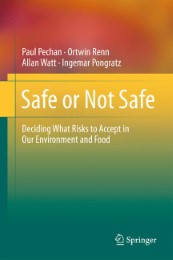Safe or Not Safe (E-Book, PDF)
Safe or Not Safe
eBook - Deciding What Risks to Accept in Our Environment and Food
Bibliographische Informationen
Format: Digitale Rechteverwaltung: Digitales Wasserzeichen
Beschreibung
Based on an EU workshop at the end of 2005, the book discusses risk and our food supply. The introductory chapter will discuss all aspects of risk and how it applies to food, from risk classification to risk management. Following a discussion of risk, the authors will present three different case studies that will emphasize the following issues:
What do we want as individuals, as a society What is the political context of the risk discussion When do we act and what are the costs of not acting/acting International trade and legal issues Moral dimensions of decision making How do we deal with the disproportionate "power" of the various stakeholders Rationality/emotive aspects of argumentation (connection between perception /live experiences, knowledge) What are facts- and do they change with time Psychological aspects: rapture of trust; the need for certainty; connection between danger, fear and risk
Autorenportrait
Paul Pechan is a researcher at the Department of Communication and Media Research, Ludwig Maximilians University Munich. His background is in molecular biology but since 2000 he has been involved in the research and communication of science to the public and youth. His latest work includes scientific papers on information recall, texts for 5 health films and a UNESCO manual for teachers.
Allan Watt is a research scientist at the Centre for Ecology and Hydrology, Edinburgh. He has led several international projects with a focus on conflicts between human activities and biodiversity.
Ingemar Pongratz is group leader and holds an Assistant Professorship at the Department for Biosciences and Nutrition at KI. Dr Pongratzs main research area is the biology and function of pHLH-PAS proteins and he leads his own research group studying the effects of dioxin exposure at the cellular level.
Ortwin Rennserves asfull professor andChair of Environmental Sociology and Technology Assessment at Stuttgart University (Germany). He directs theInterdisciplinary Research Unit for Risk Governance and Sustainable Technology Development (ZIRN)at Stuttgart University and thenon-profit company DIALOGIK, a research institute for the investigation of communication and participation processes in environmental policy making.
Inhalt
1. Risks.- 2. Biodiversity at Risk.- 3. Chemical Contaminants in Food.- 4. The Food Choices We Make.
E-Book Informationen
„eBooks“ sind digitale Bücher. Um eBooks lesen zu können, wird entweder eine spezielle Software für Computer, Tablets und Smartphones oder ein eBook-Reader benötigt. Da es eBooks in unterschieldichen Formaten gibt, gilt es, folgendes zu beachten.
Von uns werden digitale Bücher in drei Formaten ausgeliefert. Die Formate sind EPUB mit DRM (Digital Rights Management), EPUB ohne DRM und PDF. Bei den Formaten PDF und EPUB ohne DRM müssen Sie lediglich prüfen, ob Ihr eBook-Reader kompatibel ist. Wenn ein Format mit DRM genutzt wird, besteht zusätzlich die Notwendigkeit, dass Sie einen kostenlosen Adobe® Digital Editions Account besitzen. Wenn Sie ein eBook, das Adobe® Digital Editions benötigt, herunterladen, erhalten Sie eine ASCM-Datei, die zu Digital Editions hinzugefügt und mit Ihrem Account verknüpft werden muss. Einige eBook-Reader (zum Beispiel PocketBook Touch) unterstützen auch das direkte Eingeben der Login-Daten des Adobe Accounts – somit können diese ASCM-Dateien direkt auf das betreffende Gerät kopiert werden.
Da eBooks nur für eine begrenzte Zeit – in der Regel 6 Monate – herunterladbar sind, sollten Sie stets eine Sicherheitskopie auf einem Dauerspeicher (Festplatte, USB-Stick oder CD) anlegen. Außerdem ist die Anzahl der Downloads auf maximal 5 begrenzt.
Weitere Artikel aus der Kategorie "Technik/Chemische Technik"
Neuerscheinung

Lieferbar innerhalb 24 Stunden

Vergriffen

Vergriffen







